Academia
McMaster’s Imaginary Sex Ring
In 2020, a Canadian university tore up its psychology department in search of a non-existent network of sexual predators. Documents obtained by Quillette reveal how administrators allowed it to happen.
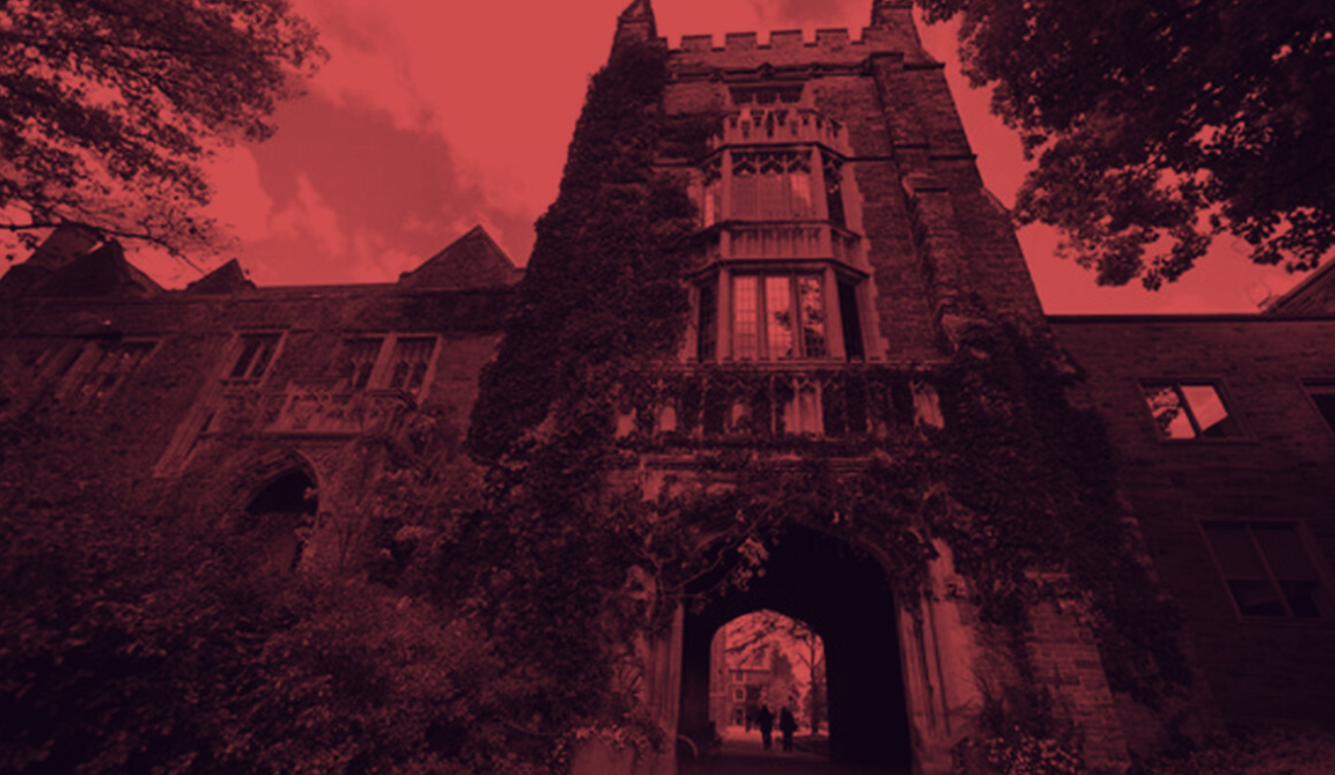
S.L.’s Tale
On May 6th, 2021, McMaster University in Hamilton, Ontario was hit with bombshell news. For more than a year, a 46-year-old psychology professor named Scott Watter had stood accused of sexually assaulting one of his department’s graduate students. But the full details were known only to police, senior university administrators, and the school’s external investigator. Now, the alleged victim was sharing her story with the public.
The 5,400-word exclusive report in Hamilton’s Spectator newspaper, written by reporter Katrina Clarke, was packed with details. According to “S.L.,” as the accuser would be referred to in court proceedings, Watter was a sexual predator who derived pleasure from watching his victims writhe in pain. S.L. told Clarke that the professor had brainwashed her, and plied her with alcohol, en route to imposing a months-long regime of sexual terror.
At times, S.L. claimed, Watter choked her till she blacked out, “put a pillow over my face and smothered me,” and twisted her nipples to the point of drawing blood.
:format(webp)/https://www.thespec.com/content/dam/thespec/news/hamilton-region/2021/05/06/this-mcmaster-student-alleges-her-former-professor-subjected-her-to-physical-sexual-and-psychological-abuse-now-shes-speaking-out/_01art.jpg)
In an especially macabre tale related by Clarke, Watter arrived at the home of S.L. and her girlfriend with a bottle of wine after being summoned on news that S.L. (who identifies as bisexual) had been cutting herself in the bathroom—whereupon, “he shut the [bathroom] door and allegedly assaulted [S.L.], touching her vagina and kissing her, [S.L.] says. Then he bandaged her cuts, she says. ‘I don’t know how much more f---ed up you can get, assaulting someone when they’re in a pool of their own blood,’ she said.”
And if the evolving narrative was to be believed, Watter wasn’t acting alone. Months after S.L. first approached McMaster’s Sexual Violence Prevention and Response Office in February 2020 with her initial accusations against Watter, she began channeling recovered memories indicating a wider sex ring within the school’s psychology department (known formally as Psychology, Neuroscience & Behaviour, or PNB).
So did a second woman—whose name, like S.L.’s, hasn’t been made public, and whom I will refer to as “Becca.”
The newly accused cast of sex-ring conspirators included none other than S.L.’s long-term live-in girlfriend, “Alice,” who, like S.L., was also a PNB graduate student; and Watter’s own wife, McMaster psychology professor Karin Humphreys.
According to the converging narratives of S.L. and Becca, both Alice and Humphreys sought to lure victims into Watter’s clutches so as to satisfy their own voyeuristic desires. During the above-described episode featuring Watter sexually assaulting a bloodied S.L. in her bathroom, for instance, Alice supposedly dialed up Humphreys as it was happening, so that the two women could jointly revel in S.L.’s agonies.
There was also alleged to be at least one more male professor in the sex ring, a man who stood accused of taking turns with Watter in raping Becca while they all attended an academic conference.
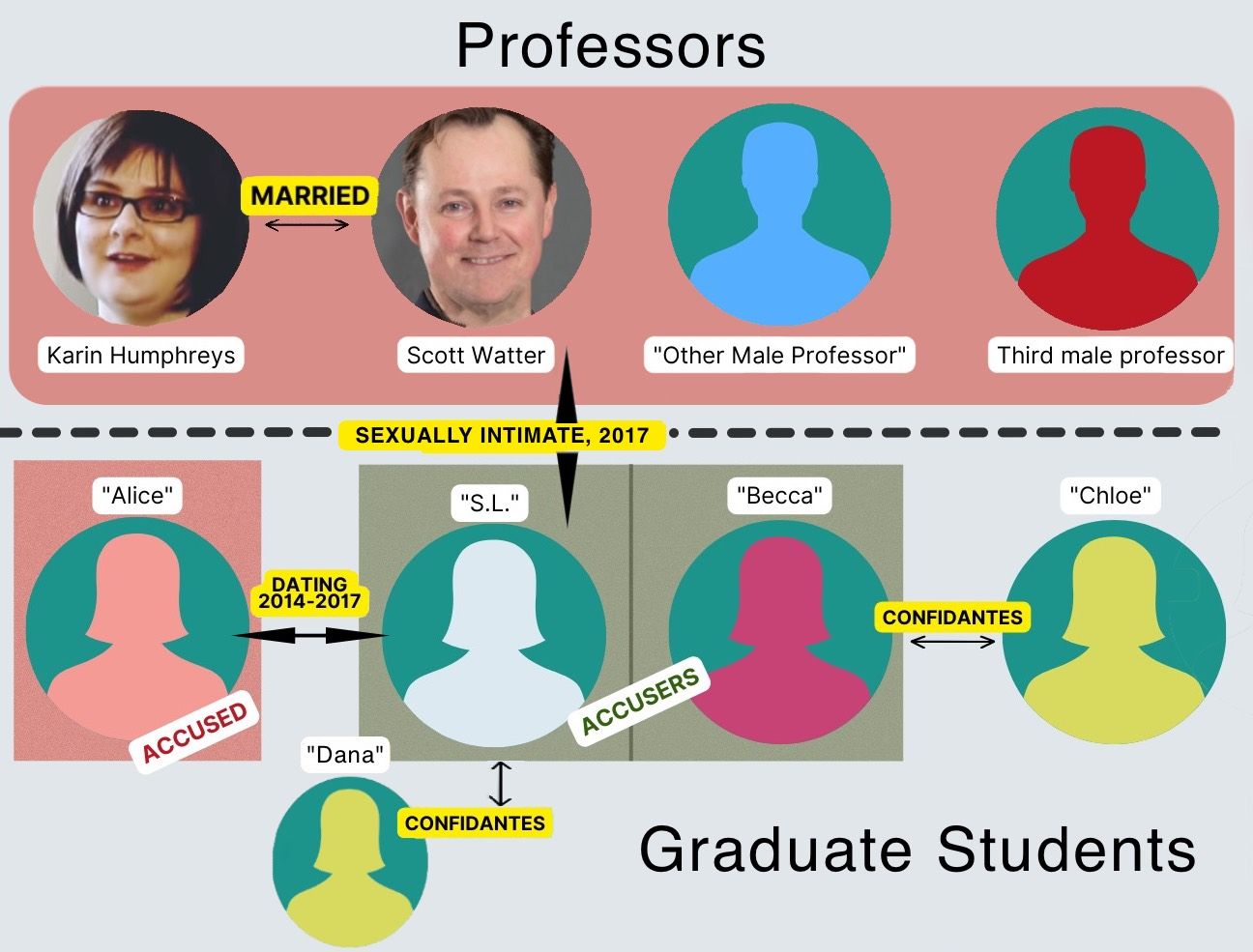
However far-fetched these claims later seemed, influential members of the McMaster administration treated them as credible. At the height of the university’s sex-ring social panic, in the summer of 2020, no fewer than seven members of the PNB department had been made subject to investigations, some lasting almost a year. During such time, all but two of these “respondents” (as they were known under McMaster protocols) were banned from setting foot on campus or interacting electronically with students, colleagues, and even alumni.
Notwithstanding the confidentiality provisions contained in applicable university policies, administrators publicized details about the respondents that allowed their identities to be quickly deduced by members of the McMaster community. Administrators also circulated warning posters, complete with photos, advising selected recipients about what steps to take if these (apparently dangerous) men and women were spotted “on or around campus.”
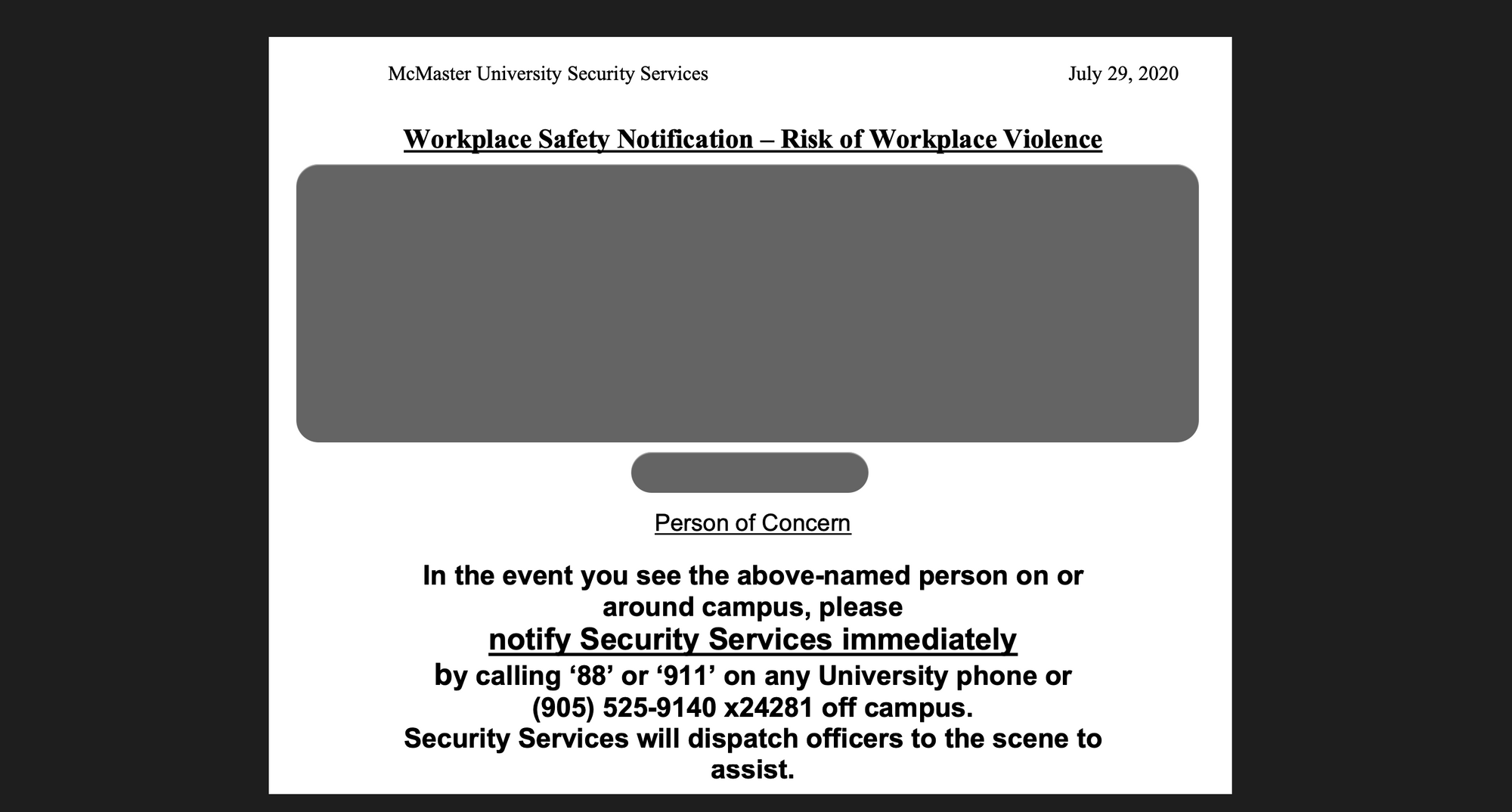
The damage done to the reputations of the respondents, and to the PNB department as a whole, was enormous. As well, day-to-day departmental operations were severely disrupted, as the suspended professors comprised almost 10 percent of core PNB faculty.
Ten in-session undergraduate and graduate courses suddenly had no professor. Eleven PNB graduate students and 50 undergraduates—“stranded” scholars, as they came to be described—immediately lost access to their supervisors, casting their thesis work, study projects, and, in some cases, funding, into limbo. A recently retired professor, Daphne Maurer, was brought out of retirement just to manage the resulting chaos.
Meanwhile, suspicions multiplied. One of the formally investigated individuals was an older woman who’d loyally served the PNB department as a rank-and-file front-line staff member for more than three decades. According to sources within the department, she’s reported to have been accused of playfully patting (or possibly pinching) a male graduate student on his behind at a 2019 social event.
The administration deployed campus security in search of alcohol, marijuana, and other suspected instruments of seduction that might be hidden in the offices of suspended academics. One of the suspected sex-ring members spent days trying to figure out how to reclaim an office plant. Another returned to campus to find that everything in his desk had been thrown into a grocery bag.
And then, the whole sex-ring narrative fell apart.
Becca, who’d been the second main accuser to come forward, withdrew from the investigative process after realizing that her nightmarish visions of a PNB sex-assault conspiracy had been the product of an unmedicated mental-health condition that had caused her to become paranoid and untethered from reality.
Then S.L.’s credibility was undermined—at first in private, by the external investigator hired by the university, and then publicly, when an Ontario judge characterized her as an “unreliable witness” and “careless with the truth” in a judgment acquitting Watter of sexual-assault charges.
Justice Amanda J. Camara concluded that S.L.’s claims were contradicted by the available evidence, which included hundreds of pages of text messages she’d exchanged with Watter. The judge also noted S.L.’s tendency to segue into stock orations about “trauma dissociation and the impacts that trauma can have on memory” as a means to “control the narrative and [advocate] her case rather than describing what happened to her.”
Ironically, the Spectator’s blockbuster article detailing S.L.’s accusations, which initially had attracted much sympathy, ended up indirectly damaging S.L.’s case, as it turned out that she had told conflicting versions of her story to police and reporter Katrina Clarke.
One might think that the acquittal of a McMaster professor on serious criminal charges would come as good news for university administrators. But in fact, it put McMaster’s president, David Farrar, in an awkward position.
In his July 28th, 2020 “Message from the President,” which had effectively sounded the starting gun on the panic that followed, Farrar had praised S.L. and Becca (though not by name) for their “courage,” while also suggesting that their claims might be just the tip of the iceberg:
Given the number of allegations and the scope of the complaints involved, it is critical that we undertake a full review of the culture of the Department of Psychology, Neuroscience and Behaviour, and address any underlying systemic issues. We owe this level of diligence and action to the complainants who have come forward.

When stories about bitterly contested sexual-abuse allegations on campus are related in long-form journalistic accounts, the accused and the accuser sometimes take turns as villains. And from the way I began this story—with a breathless recital of the claims made against Watter in the first act, followed by Justice Camara’s dissection of those claims in the second—readers may be anticipating that this familiar formula will guide the material that follows.
But it won’t, because this story is far more complex than any he-said/she-said tale of alleged sexual predation.
For reasons explained below, Watter isn’t a particularly sympathetic figure, notwithstanding his acquittal. And for their part, his two accusers come to the narrative with deeply troubled back stories, including debilitating mental-health conditions, which serve to complicate our moral understanding of their actions. Becca believed the accusations she made, at the time she made them. And the same is possibly true of S.L.
In researching this article, I conducted interviews with seven PNB scholars—a mix of professors and graduate students—all knowledgable of a substantial portion of the above-described events. While most remain angry about what happened to the PNB department, this ire isn’t primarily directed at the accused or the accusers. Rather, it’s largely aimed at the university administrators, from President Farrar on down, who ignored clear indicators that the sex-ring accusations weren’t credible.
Until now, these complaints have been confined to closed-door meetings, private correspondence, and confidential reports. The article that follows, based on interviews, internal documents made available to Quillette, and recordings of university crisis-response discussions, brings administrators’ role in the McMaster sex-ring social panic of 2020 into full public view.
Family Night
Compared to most academic departments, McMaster’s PNB program boasts an unusually diverse range of academic experts. One professor is a PhD mathematician and professional violinist who’s studied the “brain’s motor system in extracting and anticipating rhythmic structure in music.” Another studies babies’ ability to recognize faces. The department’s current chair, Mel Rutherford, is an acclaimed expert in the evolved psychological adaptations that humans have used to navigate their ancestral environments. Like many of the department’s most distinguished professors, he runs his own highly specialized research laboratory within PNB, in conjunction with a small group of hand-picked graduate students.
The close professional collaboration that takes place within these teams often yields supportive friendships that serve to blur distinctions in academic rank. Many PNB scholars have substantial clinical knowledge. And in keeping with the confessional idiom of modern psychological counselling, faculty and students seem to be comfortable discussing the state of their mental health and relationship challenges with one in another in a manner that might be regarded as unusual in other academic settings.
For these reasons, the four-way social relationship that developed among Alice, S.L., Watter, and Humphreys in the mid 2010s had not initially been seen as a subject of concern by PNB colleagues.
Alice had worked briefly with Humphreys, during which time the two forged a friendship. Alice’s girlfriend S.L. made regular visits to the home of Watter and Humphreys, where she tutored their son. The four adults would sometimes have dinner and play board games.
(While the identities of all individuals referenced in this story are known to Quillette, we have directly identified only those PNB scholars whose identities already have been disclosed, directly or indirectly, in mainstream media accounts.)
There was reportedly plenty of wine consumed at these gatherings—especially by S.L., who was experiencing depression at the time. But her later claim that the dinner invitations were a pretext for sex grooming and violent BDSM (bondage and discipline, domination, and submission) never made much sense. At these “family nights,” as the quartet called them, the professors’ young child (for whom S.L. and Alice sometimes served as babysitter) was typically in close attendance.
As Humphreys was later to learn, Watter was not a faithful husband. And S.L.’s relationship with Alice, which by this time had been a going concern since 2014, was rocky. In mid-2017, well after the quartet had begun meeting for regular dinners, Watter and S.L. became physically intimate in a manner that was aptly described by Justice Camara as “ill-advised.” (The judge also noted that “by the very nature of Dr. Watter’s position in the department and S.L.’s position as a student in that very same department, there was a power imbalance.”)
Text messages between the two suggest that S.L. (at least somewhat) shared Watter’s interest in BDSM sexual practices, but also that she was spiraling emotionally: cutting, drinking heavily, and experiencing bouts of suicidal ideation. The story S.L. told, of Watter arriving at her apartment when she was in her bathroom, covered with blood, is known to be true, in fact—at least, right up to the fictional claims about Watter assaulting her while Alice gave Humphreys a lusty play-by-play over the phone.
Far from being part of a wider sex ring, S.L. and Watter’s episodic intimacies were clandestine—successfully so, insofar as Humphreys didn’t learn about the illicit relationship until 2018.
The denouement also followed something of a conventional arc. Among the 500-odd pages of 2017-era text messages exchanged between S.L. and Watter are several that indicate the younger woman’s interest in sharing an apartment with the older male professor. When the quasi-affair ended instead, S.L. felt jilted, once ruefully telling Watter that she could “ruin” his life.
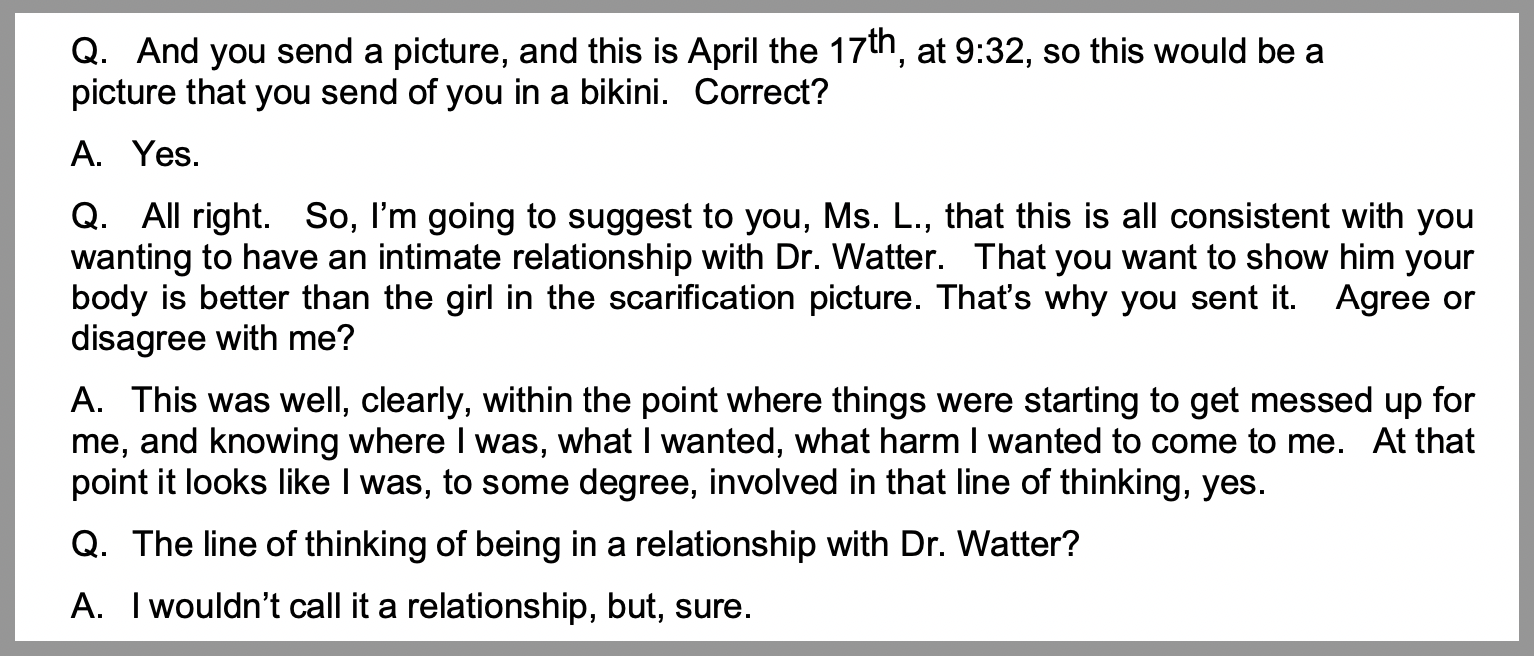
Why S.L. waited three years to make good on that threat is hard to know. What we do know is that when S.L. finally approached then-PNB chair Bruce Milliken with her allegations against Watter in February 2020, Milliken followed the school’s prescribed protocols, directing S.L. to the Sexual Violence Prevention and Response Office (SVPRO), a newly created EIO sub-unit that had begun operation just a month earlier, in January 2020.
There, S.L. duly met with Hagar Akua Prah, a veteran social worker who’d been picked as the SVPRO’s first leader—a role formally designated (for reasons described below) as “the consultant who is currently acting in the role of Director.”
The SVPRO
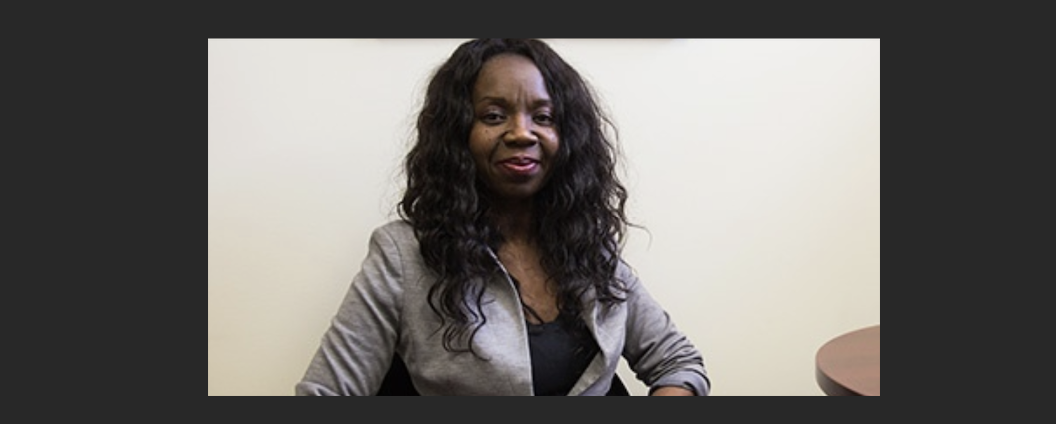
To understand why events proceeded as they did at McMaster’s Sexual Violence Prevention and Response Office, it is first necessary to take a detour into the story of the SVPRO’s creation—which, in turn, requires an introduction to its architect, an acclaimed diversity-and-inclusion administrator named Arig al Shaibah. A self-described “racialized queer woman [and] immigrant settler of Arab-Yemeni descent” with a “critical race feminist consciousness about issues of gender-based violence and other intersectional social inequities,” al Shaibah was named to head up the EIO in 2018 as McMaster’s inaugural associate vice-president, Equity, and Inclusion. Her annual salary and benefits would approach $250,000.
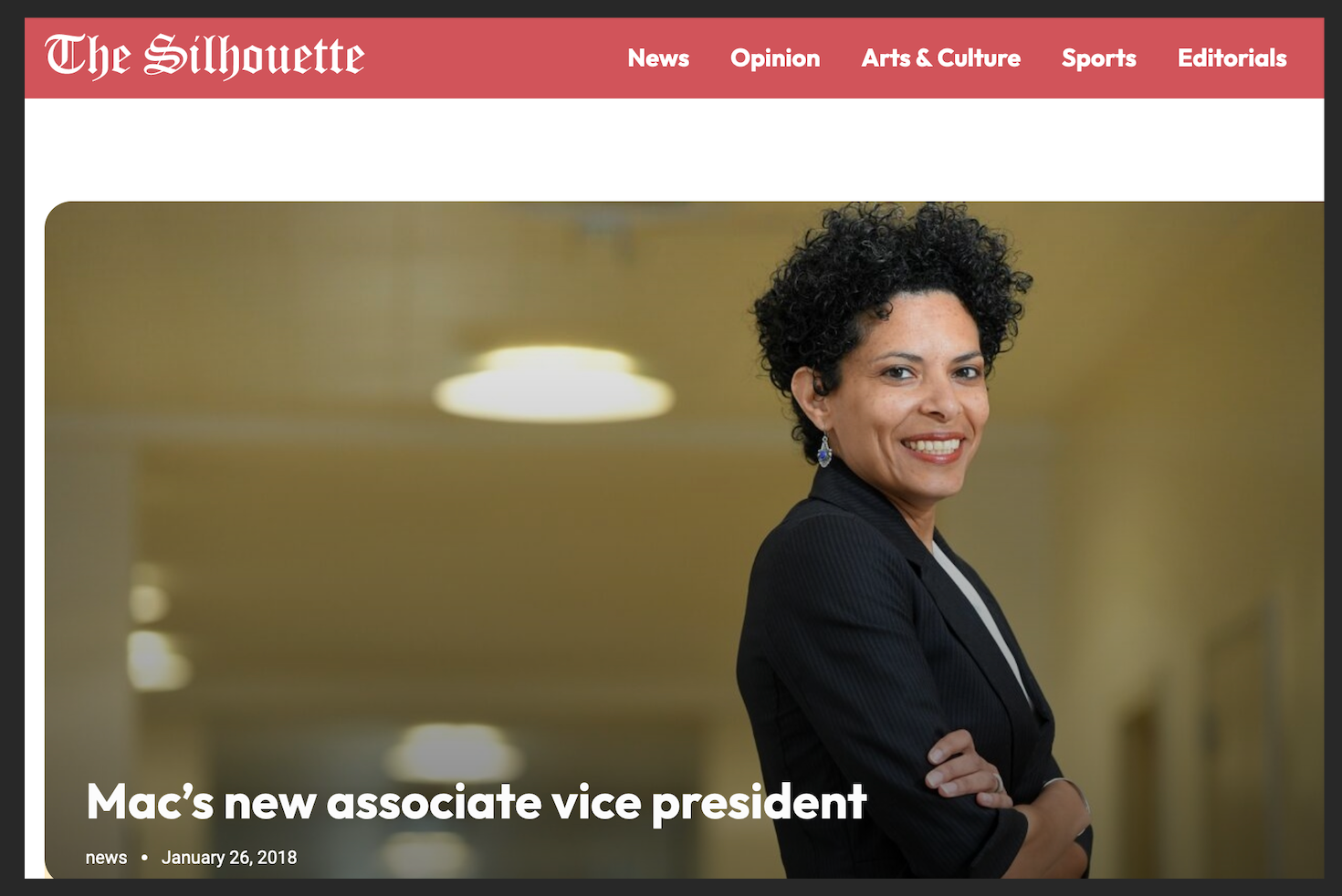
Well before coming to McMaster, al Shaibah had been a highly sought after figure in Canadian diversity, equity, and inclusion (DEI) circles, having made a name for herself at two other top universities as an advocate for aggressive DEI mandates. In 2021, she authored a 46-page report urging Canadian university presidents to empower DEI officials to create powerful, multi-tier networks of “trained equity advisors” whose authority over personnel decisions would lie outside universities’ normal institutional command chains. While al Shaibah never managed to complete this kind of ambitious plan during her tenure at McMaster, she did take several steps toward its realization.
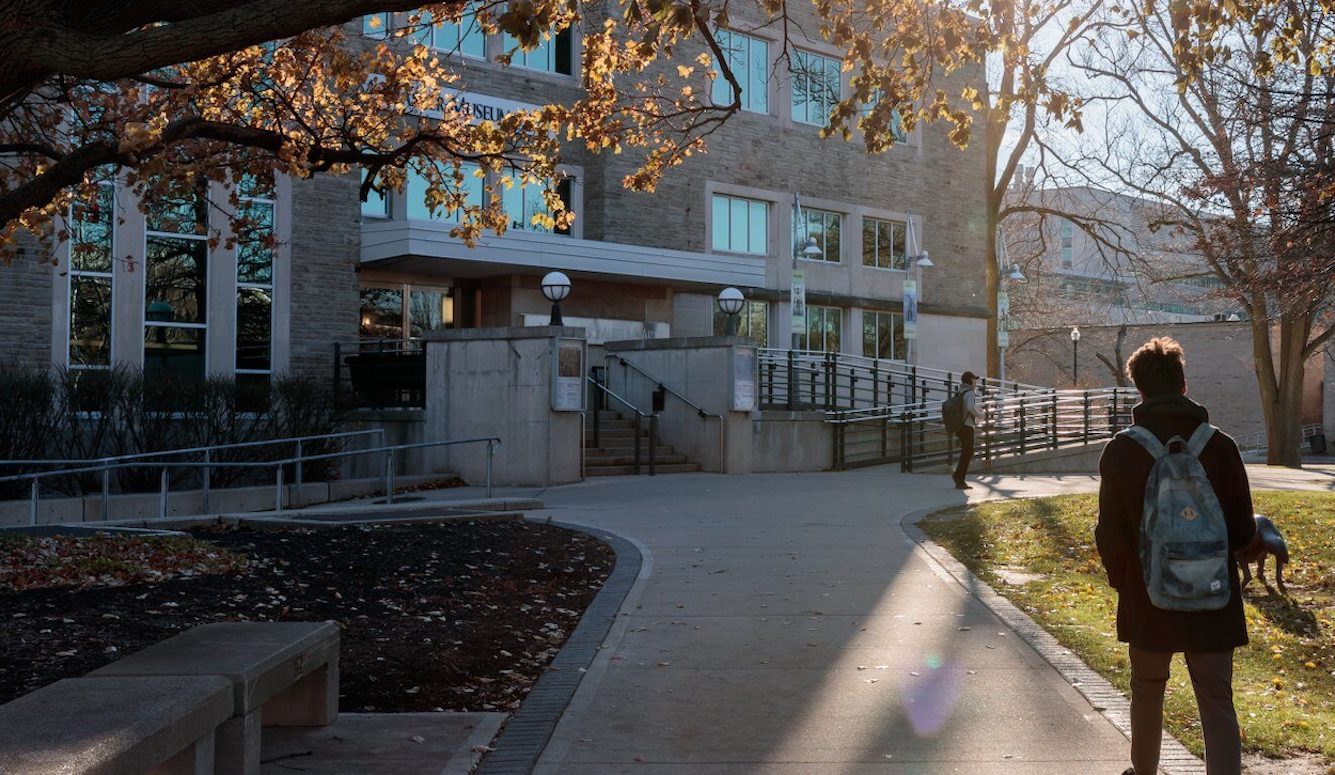
According to a December 3rd, 2019 university document, al Shaibah’s self-led “Core Review Team” installed her as the “Responsible Executive” for both McMaster’s Discrimination & Harassment Policy and Sexual Violence Policy—meaning she now had responsibility for their “operation and implementation.” In an interview with the Spectator, al Shaibah said that she wanted her department to give, as Clarke summarized it, “the right supports and resources to people coming forward with complaints, which leads to ‘stronger’ cases.”
While there’s nothing to suggest that al Shaibah took a direct role in adjudicating complaints, her arrival at the university nonetheless coincided with a quantum leap in the number of McMaster University community members who were judged to be in violation of school policies. Prior to al Shaibah’s tenure, about 50 percent of complaints made under McMaster’s Discrimination & Harassment and Sexual Violence policies had been deemed serious enough to warrant investigation. Within two years of al Shaibah’s arrival, that figure had risen to 75 percent.
Of the cases investigated, the share yielding a finding of violation shot up during the same period from 50 percent to 87 percent. All told, there was a 161 percent increase in the proportion of incoming complaints that were both investigated and judged to involve a policy violation.
Complaints specifically invoking the school’s Sexual Violence Policy went up by 25 percent. And the share of complaints involving both allegations of discrimination/harassment and sexual violence increased by 600 percent—from just two to 14. These numbers won al Shaibah great press: A Spectator story by Clarke quoted a McMaster student to the effect that “I think it shows a shift toward believing survivors in a really great way.”
But the biggest change al Shaibah made was the minting of the wide-ranging staff position whose many functions Prah would take on in her acting capacity: director of Sexual Violence Prevention and Response Office. These functions included:
- Running consciousness-raising educational initiatives for members of the campus community, whose content would “integrate an intersectional anti-oppressive trauma-informed analysis of Sexual Violence”;
- Acting as the preferred intake official for all sexual-assault complainants (formerly, responsibility for enforcing McMaster’s sexual-assault prevention and response policies had been shared by a variety of officers and departments);
- Assisting sexual-violence complainants in writing up their allegations and strengthening their cases; and
- Serving as a required member of the EIO “Response Teams” assigned to manage complaints—in which capacity, the SVPRO director would perform ongoing case management and help decide on interim disciplinary measures.
This system was new and untested when S.L. made her first formal complaint in February 2020: At this time, the Sexual Violence Prevention and Response Office had been in existence for only a few weeks. And so the PNB members accused of sexual violence by S.L. and Becca were among the first members of the McMaster community to learn just how much power the SVPRO had over the treatment of respondents.
A Second Accuser
At the time McMaster’s president published his July 28th, 2020 Message from the President, with its ominous reference to “the number of allegations and the scope of the complaints involved,” the SVPRO had just informed him that it now had not one but two complainants who’d formally made harrowing claims about the PNB department. The first had been S.L., who’d come forward back in February. And now, in June, came Becca, whose accounts seemed to back up, and even expand upon, S.L.’s claims.
As it turned out, Becca was, by her own later admission, in the throes of a serious mental illness whose symptoms included paranoia and detachment from reality. She’d reached out to the SVPRO in a state of crisis, and then retracted her claims shortly after receiving psychiatric treatment.
Becca’s version of events can be reconstructed in detail because a number of PNB scholars, several of whom spoke to Quillette for this article, recorded detailed notes about Becca’s behaviour during her mental-health crisis and the period that followed. Becca herself assisted in producing a detailed chronology of events that was also made available to Quillette. Other documents that inform the descriptions appearing below include correspondence from a former PNB department chair to university administrators; memoranda prepared by two female McMaster graduate students who interacted with, respectively, S.L. and Becca during the period at issue; excerpts from findings of the external investigator enlisted by McMaster; and the text of a formal submission regarding Prah directed to the Ontario College of Social Workers and Social Service Workers.
We also have Prah’s version of events, as set out in a detailed letter to Quillette authored by a lawyer representing both Prah and al Shaibah. As readers will see, these two accounts diverge in important respects, especially in regard to the conversations that Prah and Becca had in July 2020.
On June 24th, 2020, “Chloe,” a PNB graduate student then in the midst of completing her PhD thesis, received a call from Becca, who was in a state of pronounced agitation. Like everyone else, Becca had been spending a lot of time by herself during the first few months of the COVID pandemic.
Chloe and Becca were not especially close friends. But Chloe was well-advanced in the PNB department’s Research & Clinical Training stream, and apparently struck Becca as someone trustworthy she could talk to about the recovered memories of horrific sexual abuse (as she experienced them) that were now flooding her mind.
Becca reported that she’d been drugged and sexually assaulted by “Frank,” a former PNB student with whom she’d taken undergraduate courses. Becca also claimed that Frank had used a specific kind of brainwashing technique on Becca, which involved the use of ritualized chanting and some kind of “clicking” device.
Later that day, Becca phoned Chloe again, this time with what she described as a fresh batch of newly recovered memories. Having recently watched the television series Jeffrey Epstein: Filthy Rich (which Netflix had released four weeks earlier), Becca had come to believe that the PNB department was infected with its own Epstein-type sex ring.
Becca now remembered that someone else within the department, possibly Watter, was watching as Frank assaulted her. In addition, she now remembered that there was a second graduate student being assaulted in the same room, an as-yet-unknown victim whom she remembered as being bathed in some kind of “flickering light.”
Based on what Chloe observed, as well as certain pertinent details concerning Becca’s history, she suspected (correctly) that Becca was experiencing the onset of a serious mental-health disorder. Chloe created a journal, in which she recorded details of her interactions with Becca, on the understanding that these observations might later serve to inform any future therapeutic treatment that Becca received.
About a week later, Chloe and Becca had an in-person meeting, during which Becca reported that her memories had become more specific.
In this new telling, Watter and Frank had operated as a team, using drugs, chants, and clickers to groom Becca into sexual subservience. In notes that Chloe wrote down at the time, she described Becca’s thinking as paranoid and non-linear.
Becca also claimed that she’d been raped violently by Watter, with the knowledge of his wife, Karin Humphreys. By way of evidence, Becca told Chloe that she now remembered confronting Humphreys about the sex ring in the professor’s office, resulting in an argument that ended with Becca throwing books around the room (an incident that, as it later turned out, never actually took place).
In addition to adding new names and accusations to her narrative, Becca also asserted that the suspected sex-ring leaders were using sophisticated surveillance methods to prevent their crimes from being detected.
Becca asked Chloe if she could have her Amazon deliveries shipped to Chloe’s home instead of her own, because she was afraid that Watter and Frank had implanted a “tracking device” in her computer.
She also heard voices in her head, and came to believe that various people in her life were actually Frank “in disguise.” When friends invited Becca to social outings, she suspected these were ploys being used by the sex-ring leaders to lure her to yet another violent assault.
Becca claimed to have premonitions about which women in the department were about to be raped by the conspirators. At one point, Becca said that she had visions of Chloe herself being assaulted. Chloe assured Becca that she had not been raped.
By this time, Chloe had learned, Becca was talking to Prah, who was then newly installed in her SVPRO role. Prah was calling Becca often during this period, sometimes when Chloe was with her, and sometimes many times per day.
At a meeting in late July 2020, Becca informed Chloe that her memories had suddenly taken a radical new turn. She now claimed that Frank, who’d formerly been cast at the very centre of the sex-ring plot, wasn’t involved at all.
She said that the real evildoer was a completely different PNB figure—a professor who would soon be referred to in written accounts as “the other male professor” (an anonymized formulation I shall adopt as “OMP”).
All of her formerly articulated sex-ring memories were true, Becca still believed; it’s just that the faces of Frank and OMP had formerly been improperly “swapped” in her mind.
Becca and Prah had been speaking for weeks by this point. And Becca believed that Prah expected her to file a formal complaint with the SVPRO. Becca’s wholesale substitution of OMP for Frank in her narrative doesn’t seem to have raised red flags.
As Prah remembers it, Becca was “lucid and not dissociative, and did not exhibit any signs of a psychotic episode.” But she added that, in any case, her role at the SVPRO “was not to screen complaints or act as a gatekeeper in any manner,” nor to “assess the credibility of statements or descriptions of experience by complainants,” these beings tasks for investigators.
Insofar as any of the complainants required mental-health assistance, Prah told Quillette, she was obligated to help them get it, in keeping with her experience of providing “support, consultation, and referrals over many years of working with both complainants and respondents.”
At some point during the same in-person meeting when Becca had first discussed face-swapping, Chloe remembers, Becca took a call from Prah. When the call ended, both Becca and Chloe later recalled, Becca told Chloe that Humphreys and OMP would each be suspended by the university in coming days—a prediction that proved correct on July 27th.
When it came time for Alice, S.L.’s (by this time) former girlfriend, to be suspended by McMaster, Becca knew about that, too. Notwithstanding the confidentiality provisions contained in the rules governing SVPRO operations, Becca and Chloe recollected, Becca had advance notice of important decisions made by the Response Team—not only in regard to her own complaints, but also in regard to S.L.’s complaints.
In a lengthy memorandum sent to McMaster’s Dean of Science in early 2021, another PNB graduate student, “Dana,” reported on a July 2020 conversation she’d had with S.L., with whom she was then good friends. During that conversation, it was asserted, S.L. had (1) correctly predicted that OMP would be suspended by the university; (2) displayed knowledge of both Becca’s identity and the accusations that Becca had made against OMP; and (3) indicated that this knowledge came from Prah.
In that memo, a copy of which was made available to Quillette, Dana reported her belief that Prah “had lengthy conversations outside of working hours with [S.L.], giving [her] material to read to uncover [her] trauma, etc. [S.L.] had complete trust and devotion to [Prah], making it hard for [S.L.] to realize if something was amiss.”
For her part, Prah completely rejects the claim that she was the source of any information leaked in regard to upcoming disciplinary steps involving respondents; or of information that made its way to S.L. in regard to Becca, and vice versa.
“Information about any interim administrative leaves or suspensions was formalized through McMaster, and released appropriately on the university’s strict timeline,” she told Quillette. “[I] did not provide any such information to any complainants in advance of McMaster’s authorized release of the information—[including] information about interim suspensions.”
“Complainants sometimes receive formal notification about … interim measures by the university when the measures are relevant to them,” she added. “This may occur prior to the date the information is shared publicly … to protect the safety of complainants, [and] so that complainants and respondents have an opportunity to digest the information before it becomes more public.” But Prah assured Quillette that she “only shared information about interim suspensions or leaves when authorized by the university to do so.”
To the extent that personal information did make its way between Becca to S.L., Prah writes, it was likely that “members of the PNB community were learning about details of the complaints from friends of the complainants.”
Prah also says that “some complainants spoke to one another on their own accord,” and that, on one occasion, Prah had been advised “that a friend of one of the complainants”—a presumed reference to Chloe—“improperly disclosed the identities of the complainants to members of the PNB.”
S.L.’s accusations differed from Becca’s in narrative style. While S.L. tended to recite fully formed sex-assault narratives adapted directly from her real experiences with Watter and Humphreys, Becca’s memories consisted more of isolated sounds, clicks, lighting effects, mental snapshots, and dark premonitions. Nevertheless, the two women had begun converging toward a common mythology.
One of Becca’s memories, for instance, depicted a fictional scene in which Humphreys sat at her basement computer, naked, while Watter raped S.L. on the floor nearby. In another imagined scene, it was Becca being sexually assaulted, while Humphreys emerged from a closet wearing a mysterious black outfit.
Following a request for comment on these events, the McMaster communications department instructed me that “it is clear that individuals have been discussing and sharing with you the personal health information of complainants. This is highly irresponsible. Perpetuating such information clearly violates societal requirements to protect personal health information and is in violation of privacy legislation.”
The External Investigator
One thing that McMaster University got right, several otherwise critical interviewees told me, was its selection of the lawyer who conducted the investigations of individual respondents—a Toronto-based attorney named Katharine Montpetit.
A reading of material contained in Montpetit’s reports suggests that she properly scrutinized the gaps and contradictions in S.L.’s story. Unlike Prah and other university officials, Montpetit had an opportunity to study the exculpatory evidence provided by respondents, and then re-interview S.L. accordingly. As would later be the case in court, it didn’t take long for S.L.’s stories to unravel.

Becca, on the other hand, barely spoke to Montpetit at all. And even when she did, months after the investigations had begun, it was only to explain why she no longer believed the initial claims that she’d communicated to Prah.
Chloe, too, met with Montpetit briefly. But, being reportedly concerned about any possible reaction from Prah and al Shaibah, Chloe disengaged after Montpetit told her that she could not guarantee that her remarks would not become known to McMaster administrators.
The acute mental-health symptoms that had induced Becca’s nightmarish visions of a PNB sex ring began dissipating in late 2020, after she began receiving effective medical treatment. (Montpetit confirmed elements of this sequence of events with Becca’s doctor.) But even by the last weekend of July, when Becca filed her complaint with the SVPRO, the graduate student was already beginning to doubt her memories.
Becca remembers that she filed her electronic SVPRO complaint over the last weekend of July 2020 while Prah was on-screen, advising her on FaceTime, reminding Becca of details that Becca had reported during previous conversations, and suggesting text for her to type in to the complaint form.
Becca’s mental-health condition was so acute that she’d become scared to even open her computer, lest the sex-ring conspirators use it to spy on her. According to her memory, it was only thanks to Prah’s support that Becca braved these fears in order to log on to the SVPRO’s intake portal.
Prah remembers these events very differently. Yes, they did use FaceTime, because Becca had “security” concerns in regard to the McMaster Zoom and Teams platforms. But Prah says she never encouraged Becca (nor any other complainant) to make a formal complaint. Nor, Prah says, did she ever dictate any material to be included in the complaint. Her universal practice, Prah says, was to advise complainants “to write the complaint in their own words.”
Prah reports that her practice at McMaster was always to advise complainants of all their options. In Becca’s case, this included “options other than filing a formal complaint”—such as “tak[ing] the time needed to receive therapeutic support.” Prah also reports that when she offered this advice to Becca, Becca wrongly perceived it “as discouraging [her] from making a formal complaint or reporting the incident to the police.”
Many months later, Becca would continue to express her belief that Prah was acting in good faith to help her. In Becca’s view, Prah believed that any indecision or confusion Becca was exhibiting was a product of trauma.
At the time she filed her SVPRO complaint, Becca says, she was afraid of disappointing Prah. As Becca remembers things, Prah had already told her that faculty suspensions would begin the next week (a contention that, as noted previously, Prah vigorously rejects), in part on the basis of claims that Becca had already informally verbalized to Prah, but which now needed to be formalized. Time was running out, and Becca remembers Prah suggesting that Becca’s failure to act swiftly could have negative career ramifications for Prah herself.
Prah, on the other hand, says that she did not encourage any complainant, including Becca, to file a complaint at this time (nor at any other time); and denies indicating to Becca that she would suffer any type of professional repercussions if Becca did not file a complaint.
Without naming names, Prah added that her “understanding from some complainants was that they were being pressured to withdraw their complaints by other students who were allies of the accused faculty members and graduate students, who defended their professors and peers.”
On Monday, July 27th, 2020, just a few days after Becca submitted her complaint, Humphreys and OMP were notified by McMaster officials that they were being suspended on an indefinite interim basis; and that they were now subject to the Persona Non Grata provisions of the school’s Sexual Violence Policy. (The same fate awaited Alice, though not till August.) A day later, the president would send out his infamous (to some) Message from the President.
:format(webp)/https://www.thespec.com/content/dam/thespec/news/hamilton-region/2020/08/06/mcmaster-grad-student-suspended-after-more-complaints-about-psychology-department/mcmaster_university.jpg)
Later that summer, Becca says, she worked up the nerve to tell Prah that she wanted to retract her complaint: Her mind was clearing, and she no longer had confidence that the contents of her complaint were true.
By Becca’s account, Prah seemed to discourage this, indicating that there could be legal repercussions for Becca if she admitted explicitly that her allegations had been unfounded. Seeking a middle route between her conscience and what she believed to be Prah’s warnings, Becca withdrew from the investigation process without (yet) explicitly recanting.
Prah remembers the conversation differently. By her account, she “advised [Becca] that there could only be potential legal repercussions if someone intentionally filed a malicious and false complaint, and advised that occurs in approximately 2% of cases.”
And so Montpetit informed herself about Becca’s complaint by interviewing Prah, who answered the investigator’s questions on the basis of her own notes.
It isn’t known what Montpetit thought of this interviewee substitution. But in any case, she apparently found Prah’s description of Becca’s (former) memories to be no more convincing than the tangled claims served up by S.L.—as the external investigator made clear in reports filed with McMaster’s administration in early 2021.
Montpetit rejected all of the sex-ring accusations made by both women. She also rejected S.L.’s unrelated 2010-era sex-assault claims against a PNB staff member, as well as (also unrelated) claims against a third male faculty member.
The only serious claim that stuck, in regard to any of the respondents, was that Watter had abused his position as an authority figure by engaging intimately with a student whom he knew was looking to him for emotional and mental-health support. And even this fell under the category of harassment, not violence. The sexual activities, by themselves, didn’t run afoul of McMaster’s rules, which, as at many other Canadian universities, don’t ban sexual relations between professors and students.
On February 18th, 2021, Humphreys received a letter from the school’s provost, Susan Tighe, the designated “Decision Maker” for faculty under the school’s sexual-violence and harassment policies. Almost seven months after Humphreys’ nightmare began, Tighe finally acknowledged that “none of the allegations made against you by [S.L.] or [Becca] were substantiated.”
No, Humphreys hadn’t “derived sexual pleasure from [S.L.’s] self-harm.” No, Humphreys “did not sexually or physically assault [Becca].” No, Humphreys hadn’t invited S.L. to dinner “for the purposes of grooming [her].”
The interim measures imposed on Humphreys, a mild-mannered Australian-raised woman who studies the connection between speech and cognition, had been severe. She’d been banned from campus, barred from contact with current or former students, and prohibited from teaching or conducting research related to her academic role, even from home. She scrambled to secure an exception to this policy so she could take her son for treatment at a McMaster medical facility—and then had to go through a similar exercise when she needed to access another floor of the same facility for blood tests.
Later, Humphreys asked if a third exception could be made so that she might co-author a research paper on the subject of cognitive psychology with her father, a fellow academic who was then dying of pancreatic cancer in Australia. On August 4th, 2020, the reply came from Response Team member Pilar Michaud, one of al Shaibah’s direct reports: “Given the serious nature of the allegations, it is critical for McMaster University to retain the integrity of the conditions of your leave, and, as such, the request for an exception to engage in this specific research activity is denied.”
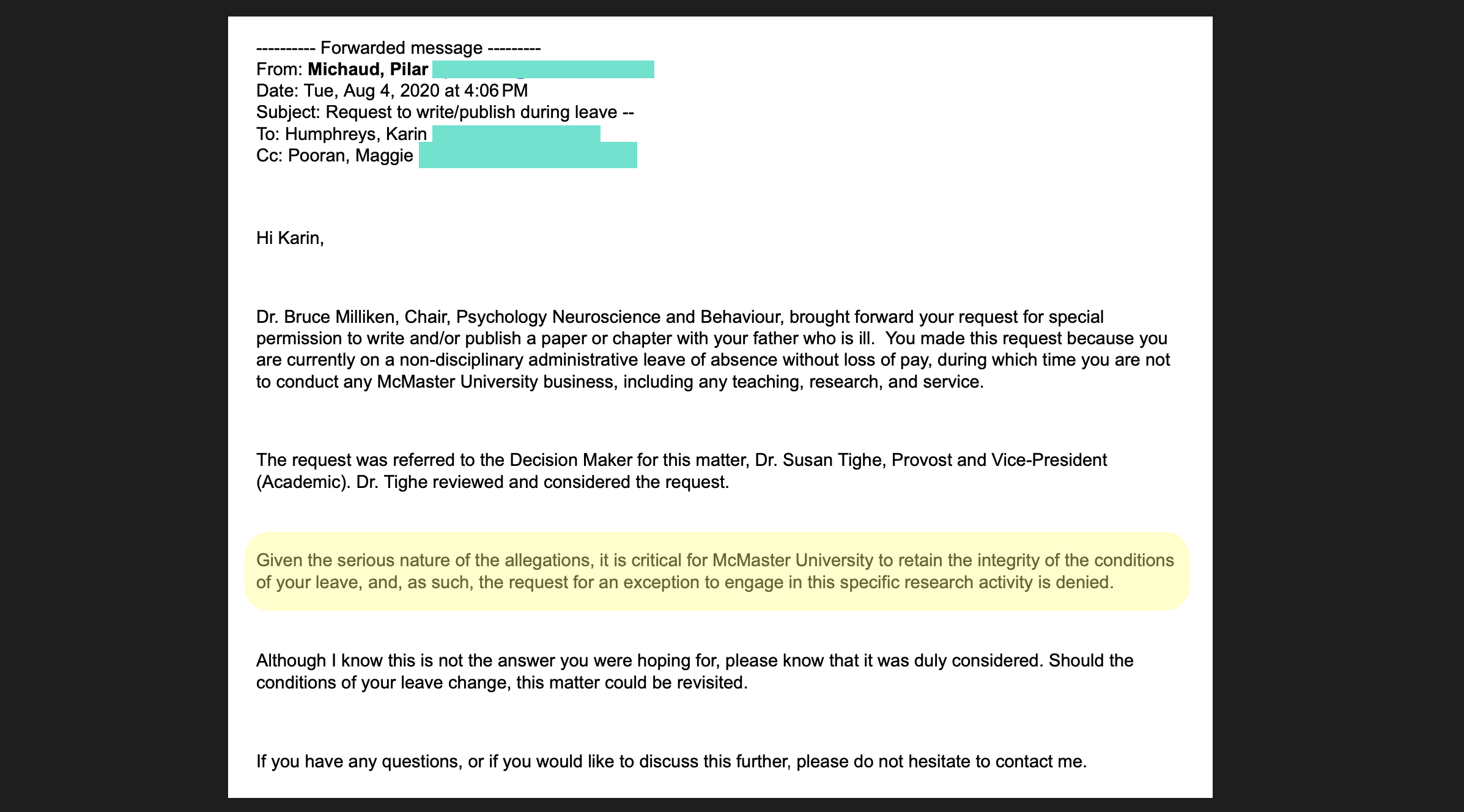
(The university relented three months later, after receiving a letter from Humphreys’ lawyer. But by this time, Humphreys’ father—a University of Queensland emeritus professor named Michael S. Humphreys, who would sometimes give guest lectures at McMaster when he was in Hamilton visiting his daughter—was unable to participate. He died on April 13th, 2021, living long enough to see his daughter completely vindicated in regard to the allegations that Michaud had cited.)
Given what Humphreys had endured, one can only imagine her sense of relief upon reading Tighe’s letter. It’s one thing to know you’re innocent of grotesque sexual crimes. It’s another thing for the “Decision Maker” who holds your fate in the balance to acknowledge as much.
But then, later on in the letter, came the kicker.
In the very last non-boilerplate paragraph of the six-page document, under the sub-heading of “Next Steps,” Tighe took an unexpected turn. Far from these “next steps” involving the university helping Humphreys repair her reputation and restart dormant academic projects, Tighe took the opportunity to upbraid Humphreys for alleged lapses of personal judgment she’d exhibited over the previous decade.
“Even though the findings of the investigation do not amount to a breach of University Policy as outlined above,” Tighe admonished, “I am concerned by your demonstrated lack of understanding of boundaries and the improper, inappropriate and at times, unprofessional, nature of your interactions and behaviour with graduate students … I have asked [your dean and department chair] to consider and implement such training and support as might be necessary to enable you to meet those expectations.”
Among the episodes listed in the provost’s letter was the time that Humphreys had let Alice stay in her basement following her breakup with S.L. in the summer of 2017. Another student was permitted to stay in the same basement 12 years ago, for two nights, while visiting Hamilton to defend his PhD thesis. A third stayed over in 2015 “in order to receive medical treatment in Hamilton.”
Perhaps no other single paragraph in all of the documents I’ve reviewed better encapsulates the whole tragicomedic arc of these events. Here was the PNB professor whom Tighe and her colleagues had not so long ago banned from campus on suspicion of being the Ghislaine Maxwell of McMaster University, now apparently being dressed down by the very same provost in part for providing temporary lodging to a sick woman seeking medical care.
For his part, OMP had to wait till April 23rd, 2021 before he, too, was fully cleared of claims that he’d violated McMaster’s sexual violence and harassment policies.
As well as probing allegations of rape and other serious offences, Montpetit had investigated claims about OMP that seem fantastically trivial. Much was made of him once sharing a marijuana joint with a graduate student outside a conference in 2018. (In their publicly circulated litany of PNB horrors, this is what administration spokespeople apparently meant when they referenced “drug use with students.”)
In one case, we learn, OMP suggested that a female postgraduate student carrying cumbersome poster exhibits around an academic conference might be less likely to injure herself if she weren’t wearing four-inch heels. In another, OMP told a lab worker whose work required her to interact with members of the general public that her cut-off jean shorts weren’t likely to make a professional impression. OMP once kept a bottle of whiskey in an office drawer, and sometimes invited students to have a shot when they celebrated news that they’d received a scholarship or job opportunity.
And once, while intoxicated, OMP “joined a dance floor” with students at a large social event, which at least one student reported as off-putting.
What seems to have happened, in fact, is that OMP—reportedly being extremely averse to dancing, whether sober or otherwise—had been dragged onto the floor by some of the more enthusiastic revellers, whereupon the mortified professor made his escape after a few minutes of desultory shuffling about.
Naturally, Tighe decided that OMP, too, required workplace sensitivity training.
This expansion of McMaster’s investigative focus—from the actions of Watter; to a supposed sex ring being run out of his basement; to a random grab bag of social missteps, ranging from a handsy grandmother’s office-party bonhomie to a middle-aged professor’s clumsy dance moves—helps explain why Montpetit’s work took more than a year to complete.
She was further delayed in completing these individual investigations by the university’s directive that she prioritize a completely separate “Systemic Review” of attitudes and behaviours within the entire PNB department.
As several of my interviewees pointedly noted, this fact raises further questions about the administration’s actions, since one might suppose that the investigation of men and women accused of running a campus sex ring would be regarded as a more urgent task than distributing generalized questionnaires about sexual harassment to hundreds of students.
The most obvious explanation for the prioritization of the latter over the former is that the administration imagined Montpetit might use the opportunity to cultivate sources who could back up the existing allegations. (As part of the question set that I sent to McMaster administrators, I asked if they might supply alternative rationales for the odd timing of Montpetit’s probes. None were offered.)
Suspicions in this regard were exacerbated when PNB faculty members got a draft copy of the “PNB Systemic Review Plan” created by Montpetit in September 2020, a copy of which was made available to Quillette. The document contains a bullet point indicating the possibility of “sending [the] survey to certain targeted [PNB] undergraduates or other individuals who have expressed concerns” about the department, with “input regarding [the selection of] these individuals to be provided by Hagar Prah.”
In the end, Montpetit’s systemic search didn’t turn up any further sex-ring claimants or evidence. What’s worse, from the administration’s perspective, she ended up compromising her survey methodology in various ways that PNB faculty members—many being experts on sampling techniques, bias detection, statistical analysis, and the like—were only too happy to detail in the formal complaints they would subsequently file under McMaster’s Faculty Grievance Policy.
Even the broad statistics that Montpetit reported didn’t really fit the university’s narrative. Yes, she’d found that at least 22 percent of the students she’d interviewed described having “heard or witnessed behaviour … which, if true, could be characterized as sexual harassment.” But, somewhat awkwardly, that number was actually lower than the corresponding figure for the university as a whole. (President Farrar would dismiss such comparisons as irrelevant, on the basis that it was only the PNB department that was under the microscope. But he also added, in a May 21st, 2021 memorandum obtained by Quillette, that if PNB scholars wished to serve up tips in regard to other departments, he’d be receptive to this information.)
From the administration’s perspective, Montpetit’s systemic report did offer at least one saving grace, however: her rhetorically helpful description of PNB as “a department whose collegiality, while having many positive qualities, has created a degree of complacency that has let inappropriate behaviours go unchecked.” (The vagueness of the word “inappropriate” was found to be especially useful: In this context, the word carries a strong whiff of disreputability, even if Tighe herself had acknowledged in her formal correspondence to respondents that behaviour she regards as “inappropriate” doesn’t necessarily run afoul of university rules.)
In December 2020, the administration publicly trumpeted the latter part of that quote—selectively excising the unhelpful references to “collegiality” and “positive qualities”—en route to announcing a remedial “action plan” set to be imposed on the PNB department.
The first listed step of that plan: “Training for faculty and staff with a trauma-informed approach.”
A review of the culture of the Department of Psychology, Neuroscience and Behaviour has been released. The Faculty of Science is committed to an action plan based on the review recommendations. For more information, please follow the link. | https://t.co/Aosj8tKTV1
— McMaster University (@McMasterU) December 3, 2020
The Return
In early 2021, the exonerated respondents began returning to work. Despite pronouncing them to be innocent in private, the university had done little to clear their names in public.
Their return had a galvanizing political effect. Being no longer muzzled by the no-contact conditions imposed under their interim suspensions, Humphreys, OMP, and the others quickly brought their PNB colleagues up to speed on the details of their ordeals, provoking outrage among those who’d formally taken their cues from official McMaster communications.
It was during this period, in mid-2021, that the PNB faculty began to adopt a more unified and confrontational approach with the administration. It’s notable that while a March 12th, 2021 PNB department grievance filed with McMaster’s president bore just 11 signatures, by the time the next two arrived on his desk, in May and July respectively, that number had roughly doubled.
My interviewees seemed especially outraged by the university president’s June 24th, 2021 public announcement to the effect that the seven investigations of individual PNB members were now complete. It had been expected, or at least hoped, that the university would publicly admit that the actual wrongdoing Montpetit had uncovered was a pale shadow on the graphic tales of rape and sexual trafficking contained in the complaints. Instead, the president delivered a lawyerly message to the effect that “in some cases, the process found that allegations were not substantiated and policies were not violated. Where appropriate, interim measures have been removed and individuals are being reintegrated into the University community.”
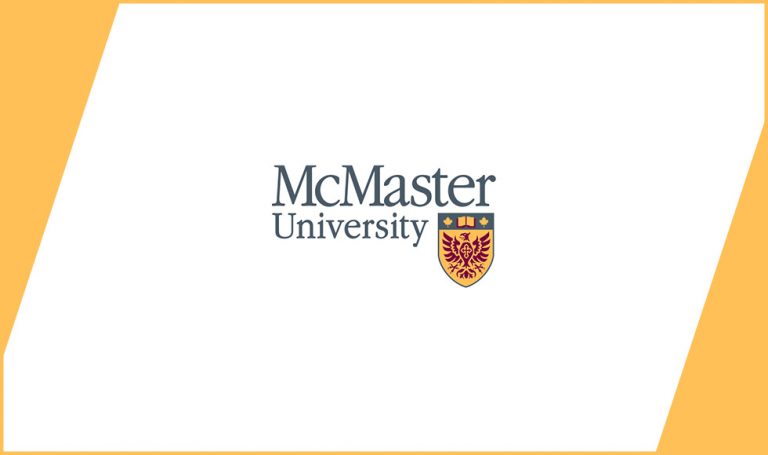
Those three words—in some cases—have stuck in the PNB department’s collective craw ever since. While the words were technically accurate (to the extent “some” may be taken to mean “almost all”), it was certainly a strange and misleading formulation to describe the outcome of investigations that had exonerated all but one person of serious accusations (and with even that lone exception being cleared of any claim related to violence or sexual assault).
Another subject of complaint among aggrieved PNB faculty was their discovery that Hagar Akua Prah, the “Consultant who is currently acting in the role of [SVPRO] director,” and Arig al Shaibah, the Associate Vice-President for Equity & Inclusion, are spouses—a fact that the university had chosen not to publicly disclose. By the time al Shaibah came to McMaster in 2018, the couple had already been together for more than two decades.

Prah and al Shaibah told Quillette that they advised McMaster administrators of their spousal relationship “immediately upon their hiring” in 2018, and that the decision to assign Prah to an SVPRO role “was made and approved by other senior administrators,” not al Shaibah. They also told Quillette that they “were open about their spousal relationship and volunteered that information to other faculty members and administrative staff.” They “did not hide that information from anyone,” and “anyone in the university community who asked about [the] relationship [was] told the truth.”
But at the PNB, according to faculty members I interviewed, the nature of their relationship became known only by happenstance in mid-2020, when a PNB professor noticed that al Shaibah (who’d formerly used the name Arig Girgrah) had thanked “my spouse, Hagar Akua Prah” in the Acknowledgements section of her PhD dissertation. (Prah provided reciprocal spousal acknowledgement in her own master’s thesis, a partially autoethnographic work that recounted her childhood in a small village in Ghana, her upbringing in southeastern Ontario, and her experiences navigating the “eurocentric, colonial, racist, sexist, and elitist norms” that she believes govern Canadian education.)
It also turned out that McMaster wasn’t the first university where al Shaibah and Prah had both worked. At Queen’s University, also in Ontario, al Shaibah served as Assistant Dean, Student Affairs (Student Life and Learning), as well as chair of the school’s Sexual Assault Prevention and Response working group; while Prah worked as an outreach counsellor and student life advisor. Several years later, at Dalhousie University in Halifax, both women worked together at the school’s Human Rights & Equity Services (HRES) office. A list of team members published during this period has al Shaibah at the top as Acting Executive Director; and Prah, as the second entry, as Director, Human Rights & Case Management.
(Prah’s lawyer told Quillette that “Ms. Prah never reported to Dr. al Shaibah at any of the universities at which they both worked”; that both women “advised the senior administrators, Presidents, and Provosts of their spousal relationship immediately upon hiring at all universities where they worked”; that “Dr. al Shaibah and Ms. Prah have complied with all conflict-of-interest policies and protocols at all universities where they have both been employed, including McMaster”; and that “McMaster legal counsel and senior administration officials explicitly cleared them of any conflict-of-interest allegations.”)
McMaster has a longstanding, publicly-stated policy in regard to family members, dictating that the university will not “knowingly employ relatives in a direct supervisory relationship.” A separately encoded policy states that “a conflict or potential conflict of interest exists when an employee of the University engages in an intimate relationship with a person who reports to them in an employment or supervisory relationship or who relies upon them for opportunities to further their academic or employment career.”
In the case of al Shaibah and Prah, the school would assert that it had satisfied requirements by setting up a diagonal reporting system whereby Prah was formally identified as “Consultant, Sexual Violence,” and assigned to the supervision of another vice-president (McMaster Associate VP for Students and Learning Sean Van Koughnett), with her role at the SVPRO then being structured through a “secondment.” (Prior to this secondment being put in place, Prah told Quillette, she had worked in Van Koughnett’s department as an Intercultural Affairs Advisor, beginning in 2018.)
Under this arrangement, al Shaibah had no formal authority over Prah, despite the fact that the SVPRO itself was, as of January 1st, 2020, a sub-unit of al Shaibah’s Equity and Inclusion portfolio.
I’ve seen no evidence that al Shaibah circumvented the letter or spirit of this structure by seeking to provide her spouse with professional supervision during their time at McMaster. The problem, says a McMaster source who dealt frequently with Prah in 2020, was the opposite: Prah was operating without a supervisor located within the EIO, and so often found herself out of her professional depth.
In a June 18th, 2021 email obtained by Quillette, Van Koughnett, Prah’s boss, defended the university’s SVPRO staffing arrangement as being not only consistent with McMaster’s Conflict of Interest policies; but also with the Code of Ethics governing Prah in her capacity as a provincially accredited social worker, which bars arrangements that give rise to any “reasonable apprehension” that personal influences have come to bear on professional conduct.
Three days later, McMaster Provost Susan Tighe, Van Koughnett’s boss, sent a follow-up email, elaborating further defences that, by her description, she’d been moved to articulate after having “had the opportunity to reflect” on the nature of al Shaibah and Prah’s relationship, and the steps the university had taken to accommodate it. She disclosed to PNB faculty members (for the first time, apparently) that the relevant facts had all been disclosed in timely fashion to McMaster’s “President, Provost, and other key parties” at the time Prah was hired.
When I asked McMaster who those “key parties” were, they didn’t tell me. But a McMaster communications official did send me the following statement:
The fact that two individuals are married and working for the same employer is not a conflict of interest. The university ensures that when employees are married the relevant individuals have clear and separate reporting lines. To suggest otherwise is inaccurate and potentially defamatory.
Pushing Back
In late May 2023, I emailed various other questions to the McMaster officials named in this article. They responded collectively, by way of a university communications official, whose answers included the following statement:
Serious, and in some cases potentially criminal, allegations of sexual misconduct were made to the university. In such cases, the university has an obligation to investigate under the Occupational Health and Safety Act [OHSA], the Ontario Human Rights Code, and our own policies. Not to do so would be unlawful. Any suggestions that the university shouldn’t have investigated and taken appropriate interim measures are highly negligent. When investigations disprove any allegations, interim measures are lifted.
It is inaccurate to suggest that within the multiple investigations no findings of misconduct were made. While some allegations were determined to be unfounded, in other cases there were violations of university policy and the investigations highlighted numerous concerning issues including extreme lack of professional judgment, improper commentary to students, excessive drinking of alcohol with students and drug use with students. Such actions potentially place students at risk and cannot be tolerated.
This statement accords with the position that President Farrar began staking in 2021, in his written responses to official PNB grievances filed with the president’s office. Therein, he argued that the only substantive decision that McMaster’s SVPRO had been tasked with making was whether there had been a “prima facie case of a [policy] violation.”
Indeed, the words “prima facie”—a Latin phrase whose use in this context means “accepted as correct until proven otherwise”—appear four times in just one of Farrar’s letters.
Which is to say that Farrar argues that as soon as Prah understood any of the complainants to be asserting that a member of the university community had engaged in sexual violence, it became necessary to mobilize a Response Team, conduct “a thorough and impartial investigation,” and “implement appropriate interim measures to reduce the risk of further harm.”
The university had no choice, Farrar said, not only under its own policies, but also under applicable provincial and federal law: To take any other course of action would be to “violate McMaster’s legal and ethical obligations,” and thereby compromise the “safety of the community.”
Farrar further argued that “McMaster’s staff, including Ms. Prah, acted appropriately to ensure confidentiality and to support all respondents.” His only pointed criticism was reserved for the PNB grievors themselves, whom he chastised for their “attempted use of the Faculty General Grievance Procedure to bring forward these particular concerns.”
Perhaps the most unexpected claim the president offered was that the professors who’d put their names to the filed grievances—many of them being experts in psychology, we should not forget—had “fail[ed] to appreciate that a trauma-informed response [to] allegations of discrimination, harassment, and sexual violence can co-exist with fairness and objectivity during the investigation process.”
In this regard, the president saw fit to append a capsule-form social-justice lesson, to the effect that “a trauma-informed process is one that includes an empathetic, non-judgmental, and culturally relevant response to potential complainants, and recognizes the ways in which sexual violence intersects with other forms of violence and social inequities.” (Farrar’s own academic specialty, in case you’re wondering, is chemistry.)
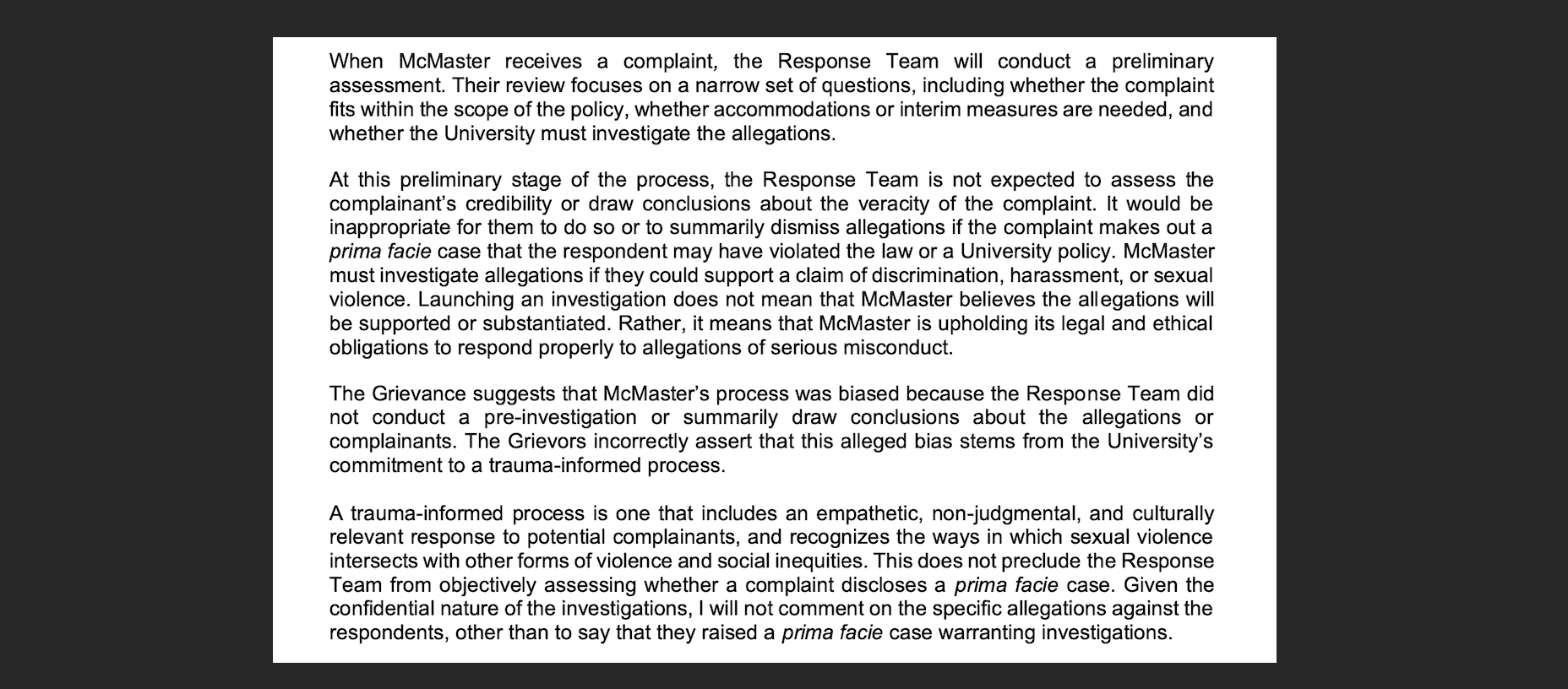
To give the president his due, it is completely true that victims of crimes, including sexual crimes, sometimes do misremember or garble the facts surrounding their experiences. And even in our modern, supposedly enlightened, times, headlines are littered with examples of sexual predators terrorizing communities, including universities, for years, or even decades, before anyone in power assigns credibility to the stories of whistleblowers.
Just six months before S.L. first came forward with accusations, it’s worth noting, Dartmouth College in New Hampshire settled a class-action lawsuit with psychology students who’d described being harassed and groped by a group of male professors who’d invited them to bars and hot-tub parties. Even as I write these words, in May 2023, the New York Times is reporting on the many influential British media figures who’ve suppressed whistle-blowers’ reports of alleged sexual harassment perpetrated by a famous columnist at the Observer.

But if Farrar’s arguments are to be taken at face value, his university has taken the treatment of complaints to the opposite extreme—since the words “prima facie case of a violation,” as the university president uses them, would seem to encompass literally any claim of sexual violence, no matter how obviously implausible the associated narrative. Indeed, by the expansively defined “trauma-informed” principles evidently embraced by McMaster, even the most radical flight from reality is presumed to represent the mind-warping effects of sexual violence.
If it really were the case that all “prima facie” complaints should be reflexively treated as valid until proven otherwise, I asked McMaster’s senior administrators, would a dozen PNB scholars, or even a hundred, have been similarly suspended if they’d all been identified by Becca as sex-ring members alongside Watter, Alice, OMP, and Humphreys? I’m guessing that Farrar’s answer to that question would be no. But since his office never responded to me on this point, it’s not clear what principled basis he’d offer for doing so.
As far as I can tell, none of the suspended PNB scholars got a chance to address the complaints made against them before their suspensions began. Nor were they initially informed of what those complaints were, or who had made them. Humphreys, for instance, had to wait till October 21st, 2020 before being advised of the claims that formed the basis for her treatment—almost three months after first being cast into professional purdah.
As a result, respondents had no timely opportunity to point out even the most obvious errors and contradictions contained in the claims. To take one example of many: A complaint made against Watter situated him as lead assailant in a fictional gang rape that took place at an out-of-town conference. It would have taken perhaps 10 minutes to determine that he hadn’t even attended that conference. Instead, he’d been at home taking care of an ill child.
This isn’t the first journalistic investigation of a campus witch-hunt I’ve helped investigate, whether as editor or writer. But it is the first such case I’ve examined in which accused individuals and a critical mass of their colleagues—men and women alike, it should be noted—pushed back against administrative overreach in a vigorous and sustained manner.
In part, this seems related to the absurdly severe—and, to many PNB observers, gratuitously cruel—restrictions placed on respondents. The fact that three of the seven investigated individuals were women also seems to have played an unspoken role.
Another factor worth noting is that this campus scandal, unlike various others of its general type, did not overlay upon any apparent pre-existing political schism or power play within the affected department.
As far as I can tell, all of the major PNB players in this drama, accusers and respondents alike, exhibit the same laudably feminist, left-of-centre political views that one might expect from typical faculty members at a Canadian university. Even when denouncing the administration’s actions, the PNB scholars I spoke with invariably included caveats to the effect that they support institutional policies that encourage victims of sexual violence and harassment to come forward.
It struck me that many PNB members seemed empowered to protest the administration’s actions thanks to their own extensive academic expertise in areas pertinent to the underlying claims—including mental illness and behavioural pathologies. Phrases such as “trauma-informed” held none of the talismanic, argument-ending power they might have had if the subjects of investigation had been, say, McMaster computer scientists or geologists.
The department’s chair during these events, Bruce Milliken, is an experimental psychologist who has published peer-reviewed studies on the formation of human memories. Documents reviewed by Quillette indicate that, as early as August 2020, he was warning the administration that “recovered memories” of the type Prah was collecting often prove to be false memories.
He also pointed out that such false memories had been weaponized in the 1990s to prosecute innocent people for non-existent sex crimes against their own children, the unstated parallel with McMaster’s own sex panic being rather obvious.

Even the administration’s (again, normally unanswerable) speechifying about DEI failed to intimidate PNB faculty members, since this, too, is a field studied by such PNB experts as Sukhvinder Obhi.
In a September 2020 conference call that the provost and dean of science conducted with members of the PNB department (which was recorded by a member of the McMaster administration staff, and subsequently made available to Quillette), Obhi opined that the university’s actions reflected a badly botched understanding of DEI principles. (The professor also reported that he’d recently decided against publishing an academic paper he’d authored on the subject of DEI, out of concern that the scandal at McMaster might taint the response from editors and readers.)
Some of the internal McMaster documents I’ve inspected suggest that certain PNB scholars came to see the university’s actions as being motivated by antipathy toward their department. The more likely explanation, I believe, is more banal.
While Prah didn’t screen out the dubious sex-ring allegations that would upend the PNB department, there’s no evidence that she consciously promoted narratives she knew to be untrue. Just the opposite, in fact: Her embrace of trauma-informed precepts meant she was predisposed to explain away even obvious contradictions and far-fetched descriptions by reference to the mentally destabilizing effects of sexual violence.
Nor can this apparently excessive reliance on a “trauma-informed” perspective be fairly laid at Prah’s feet. As already noted, the requirement to be “trauma-informed” in every aspect of SVPRO operations was baked into the job description. Indeed, the words “trauma-informed” appear no fewer than nine times in the 2020 McMaster Sexual Violence Policy brought in under al Shaibah.
Moreover, thanks to the administrative arrangement that McMaster had set up for Prah, she had no direct day-to-day supervision from a fellow EIO specialist who might offer counsel, or any kind of second opinion, on incoming complaints: As administrators emphasized repeatedly to Quillette, Prah’s only boss was a vice-president overseeing a different part of the university.
Compounding this problem was the fact that the SVPRO director’s role seems to have been poorly designed to begin with, combining a wide variety of job functions in the same office. This flaw likely would have become apparent in due course anyway, whoever was holding the job. But it certainly didn’t help that the very first person to step into this new and untested role was doing so under a jury-rigged system.
All of which to say, there were at least three factors that combined to strip the SVPRO intake system of effective checks and balances: (a) the overloading of job functions contained in the SVPRO director’s job description; (b) the special arrangements surrounding Prah’s secondment; and (c) the endlessly repeated insistence by administrators at all levels that “trauma-informed” leeway must be applied to all claims.
Within the ranks of the senior university administrators who sat several levels above the SVPRO on the university organization chart—the provost and president in particular—there were also ideological and political sensitivities at play. Like many university administrators, Tighe and Farrar were under constant pressure from both the media and campus activists to take a more hard-line approach to the “rape culture” allegedly contaminating their campus.
:format(webp)/https://www.thespec.com/content/dam/thespec/news/hamilton-region/2020/12/15/whisper-network-more-sexual-violence-investigations-more-violations-of-policies-new-mcmaster-report-reveals/mcmaster_campus2.jpg)
How would it have affected their reputations as progressive, “trauma-informed” administrators if they had not taken a maximalist approach to the sex-ring accusations that Prah and her Response Team had sent up the command chain? Even if doubts about the sex-ring claims were widespread among these officials—as I suspect they were—who dared express them?
Ironically, the one protagonist in this story who made an effort to apply the brakes on this social panic before it was too late—the one person self-aware enough to revisit her original beliefs—was the woman who, by her own admission, had been suffering an acute mental health crisis.
By contrast, it was the supposedly level-headed experts in university administration, disciplinary process, and “trauma-informed” care who, whether due to ideology, careerism, pride, stubbornness, or some other, unknowable motive, kept refusing to course-correct.
Fallout and Epilogue
In combined form, the PNB department’s collective complaints about the administration’s behaviour run to almost 50 pages—a total that doesn’t include the equal number of grievances filed by individual respondents. We don’t know the exact financial terms under which these grievances were settled by the university. But whatever the terms were, McMaster’s administrators clearly believe they were generous enough to provide affected PNB scholars with a sense of closure. In a statement provided to Quillette, a McMaster communications official wrote:
Those with grievances chose to settle the grievances rather than take matters through a process of litigation, which would have required them to testify and be subject to cross examination. Instead of embracing grievance settlements, career supports, and remedies put in place to enable the department to move forward in a positive way, it is disappointing that certain individuals have chosen to continue making unfounded allegations.
For their part, what many PNB academics find “disappointing” is the university’s refusal to apologize, or even publicly admit its mistakes. These academics include the department’s current chair, Mel Rutherford, who’s helped distribute a one-page document titled “Summary of Findings,” listing the department’s complaints in condensed form. Among them: “To this date, there has been no attempt by the Administration to correct the narrative for the McMaster community.”
On March 7th, 2023, during a meeting with Rutherford, a certain senior McMaster administration official confronted the PNB chair about the Summary of Findings.
According to a person in the room, the official vented about the failure of PNB faculty to let their complaints drop. It is alleged that the official also threw in some pointed remarks, which will not be repeated here, that have since become the basis of a complaint submitted to the Ontario Human Rights Commission; screamed, “Fuck you” at Rutherford; and, with the left hand, gave Rutherford the middle finger.
These claims and descriptions have not been proven in court, nor upheld by a human-rights tribunal or any other administrative body. And a McMaster communications official told me that the associated allegations “are totally unfounded and will be vigorously defended in any forum.”
A month later, in April 2023, provost Tighe informed Rutherford that another outside law firm would be paying a visit to PNB, this time on vaguely described suspicions that Rutherford runs a department that’s insufficiently “inclusive.”
It was an odd claim to direct toward Rutherford, a man who—did I neglect to mention?—had recently been publicly lauded as the first transgender department chair in the history of McMaster University.
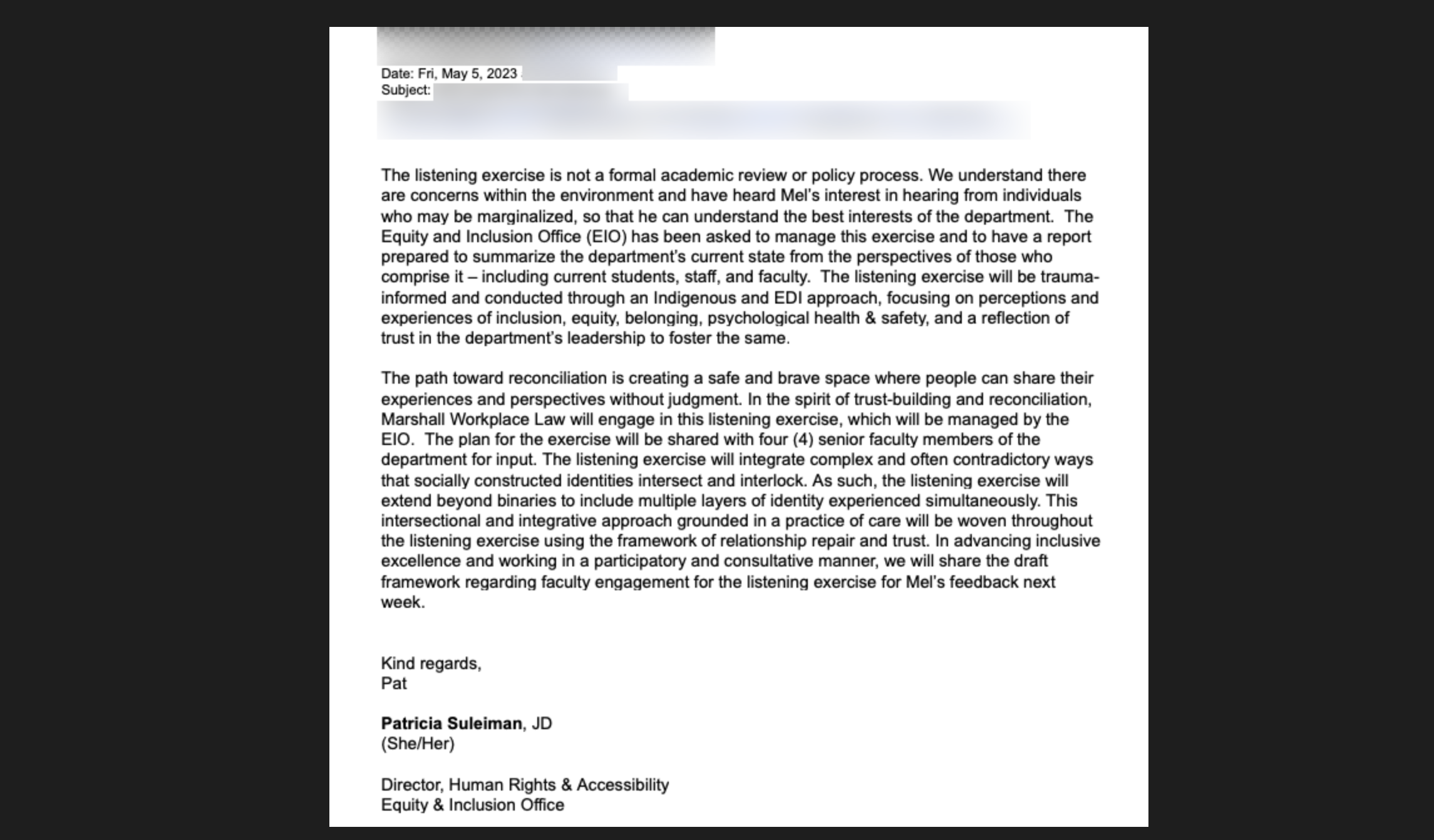
According to McMaster’s EIO, the lawyers coming to visit PNB will not be conducting an investigation per se. Rather, it will be a trauma-informed “listening exercise” that is to be “conducted through an Indigenous and EDI approach, focusing on perceptions and experiences of inclusion, equity, belonging, psychological health & safety, and a reflection of trust in the department’s leadership to foster the same.”
:format(webp)/https://www.thespec.com/content/dam/thespec/news/hamilton-region/2021/07/09/mel-rutherford-becomes-first-transgender-department-head-at-mcmaster/mel_rutherford1.jpg)
In September 2022, McMaster University mandated an External Review of its Equity and Inclusion Office. This was, in itself, a small victory for PNB faculty who’d been raising the hue and cry over the EIO’s operations for the past two years—notwithstanding McMaster’s odd (or, by this point, perhaps not so odd) decision to conduct the review without permitting input from anyone in the PNB department.
In addition, McMaster is conducting an ongoing review that “aims to improve the university’s processes related to its Discrimination and Harassment, Sexual Violence, and Research Integrity policies.” And it seems that this exercise, too, will be conducted without the input of some of the people most affected by the administration’s past missteps: On May 30th, 2023, Karin Humphreys informed the lead investigator, Michelle Flaherty, that she would very much like to participate—whereupon Flaherty replied, “I am not able to meet with individuals who have ongoing grievances.”
(It’s worth noting that Flaherty’s law firm is at least the third that’s been hired by the administration to conduct either an external investigation, review, or “listening exercise” in regard to the 2020 sex-assault allegations or matters that arose in its aftermath. This is on top of the services provided by McMaster’s legal point man on the whole affair, George Avraam, a partner at the top-drawer international firm of Baker McKenzie; the salaries paid to respondents put on lengthy leaves; the squandered grant money that went unused by the PNB department during the suspensions; and the undisclosed amounts required to make good on PNB grievances. According to figures that the Spectator’s Katrina Clarke got in 2021 following a freedom-of-information request she’d submitted, the university paid more than $600,000 in legal costs for just one of the many investigations it ordered. It seems likely that the full financial cost of McMaster’s 2020 sex-ring panic is well into the mid, or even high, seven figures.)
:format(webp)/https://www.thespec.com/content/dam/thespec/news/hamilton-region/2021/12/06/revealed-mcmaster-paid-610000-to-lawyers-investigating-an-embattled-department/mac_psychology_building.jpg)
McMaster’s External Review of its Equity & Inclusion Office was published in early 2023. While the text of the document is written on a no-names basis, the authors’ meaning comes through clearly nevertheless. At one point, they write of the need for “critically examining governance and operational structures” at the EIO. “This separation is essential to avoid any conflict of interest [arising from] being privy to sensitive knowledge that can [undermine] due process.”
On the next page, the authors added that “hiring decisions at McMaster need to be done in a transparent and consistent manner. The bar is even higher in the EIO,” and that “all decisions pertaining to the office and its role need to be made in a manner befitting the ethical commitments of the institution and the transparency needed to rebuild trust and confidence, which may have been compromised due to a perceived lack of adherence to due process in the past.”
Not surprisingly, these thinly veiled criticisms of the EIO brain trust were enthusiastically signal-boosted by PNB critics.
As it happens, however, al Shaibah was no longer a McMaster employee by the time the report was released.
On June 13th, 2022, three months before the review authors got to work, McMaster announced that al Shaibah was moving to the other side of the country, where she’d be leading the Equity and Inclusion Office at the University of British Columbia (UBC).
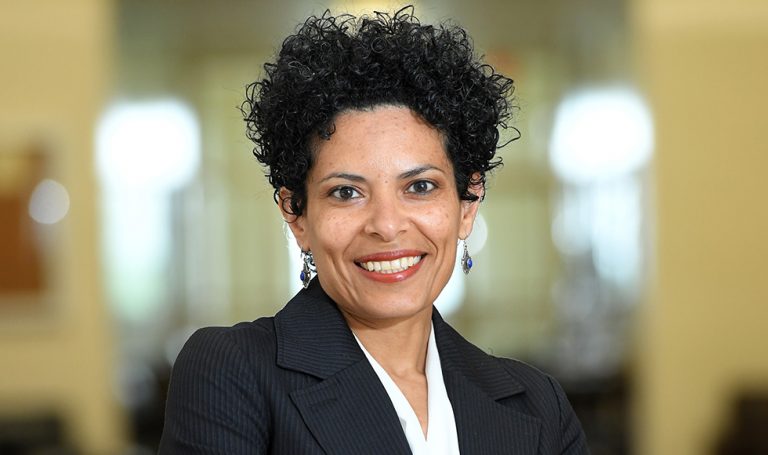
“We are thankful to have had Arig’s expertise and dedication in support of McMaster’s ongoing commitment to equity, diversity and inclusion and to the important work at our Equity and Inclusion Office,” said Tighe. “McMaster’s pursuit of Inclusive Excellence is an institutional priority.”
By this time, al Shaibah’s wife was off the McMaster payroll, too. On May 13th, 2021, al Shaibah informed senior administration colleagues that the EIO was looking for someone to replace Prah at the SVPRO. Prah’s replacement started work on April 25th, 2022, shortly before Prah and al Shaibah would start packing up for British Columbia.
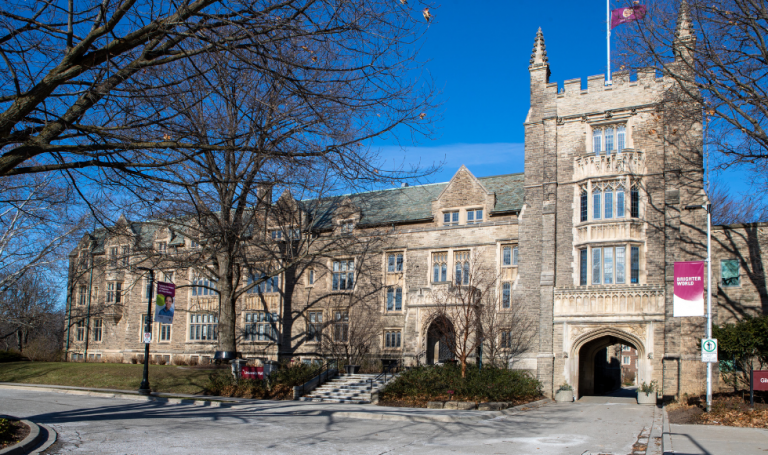
Also departed was the school’s Director of Human Rights & Dispute Resolution, Pilar Michaud, the only other mandatory member of the sexual-violence Response Teams convened under al Shaibah’s centralized EIO architecture. Michaud left in May 2022, just weeks before al Shaibah’s departure was announced.
According to her LinkedIn profile, she’s now living in Houston, Texas “on voluntary hiatus.”
Meanwhile, at the University of British Columbia, al Shaibah seems to be fitting right in.
A recently amended document on the University of British Columbia’s website announces UBC’s commitment to “trauma-informed, impartial, equitable, and confidential investigation and adjudication processes under the Sexual Misconduct Policy.” There also appears a list of resources available to anyone who has “been named as a respondent, against whom an allegation has been made, or who is alleged to have caused harm.”
Alleged wrongdoers seeking more information are provided with the phone number and email address of UBC’s newly hired “Respondent Resource Specialist,” a veteran expert in the field who’s been mandated to provide respondents with assistance as they face “the potential for distress as a result of the investigation process.”
Her name? Hagar Akua Prah.
As for David Farrar, he’s still the president of McMaster, and, by all indications, is keeping extremely busy with new projects and spring travel.
In December 2022, a lunch date at Farrar’s home was offered as a prize in a McMaster auction held to benefit the local United Way charity. Small worlds being what they are, the winner turned out to be none other than Karin Humphreys. After the university confirmed that her $200 payment had cleared, the lunch was scheduled for March 24th, 2023.
Alas, when Humphreys then notified the president’s assistant of the guests who would accompany her—a list that included three PNB faculty members, and a graduate student whose life had been upended by the 2020 sex-ring social panic—it was discovered that the president had a scheduling conflict.
The lunch would have to be delayed, an assistant told Humphreys in a March 13th email. But the professor was assured that the president’s office would be back in touch, just as soon as the assistant “confirm[ed] a few spring travel dates.”
As of press time, Karin Humphreys is still waiting.









